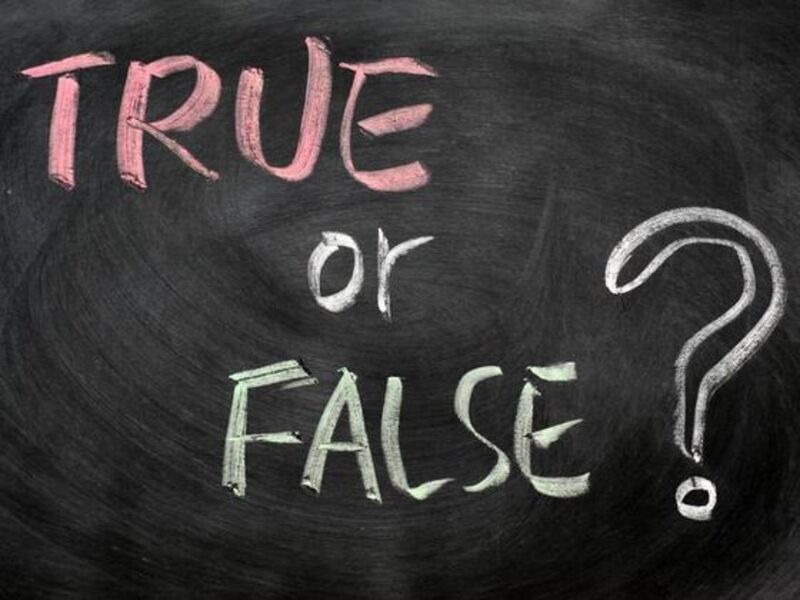Featured Image

Summary
What do you know – or think you know – about the ADA?
As we know, the ADA celebrated its 31st anniversary in July of this year. But based on recent questions we have received at the ADA Center there is still incorrect information floating around out there. What do you know – or think you know – about the ADA?
Test yourself with the true or false questions below.
- The ADA requires that public buildings have power doors in all new facilities.
- A miniature horse can be considered a service animal under the ADA.
- The ADA ensures that people with disabilities have the same rights and opportunities as everyone else and this includes people with addiction to alcohol and people in recovery from opioid and substance use disorders.
- Mental health issues such as depression could be a disability under the ADA.
- A job applicant must always disclose if they have a disability.
- The ADA requires a landlord in an apartment to make reasonable modifications or accommodations to a renter with a disability.
- A hospital has met its effective communication obligation by always providing a Video Relay Interpreter for a customer who is D/deaf.
- All individuals who are blind can be accommodated by the provision of braille documents.
- Entities that receive federal funds are not only responsible for ADA requirements, but also for Rehabilitation Act requirements.
- A business that employs less than 15 employees does not have to provide accessibility to its customers.
How did you do? Here are the answers:
- False - Although automatic doors can provide greater accessibility, they are not required by the ADA Standards. Accessible door requirements can be found here: Opening Doors To Everyone | ADA National Network (adata.org).
- True - A public entity or private business must allow a person with a disability to bring a miniature horse on the premises as long as it has been individually trained to do work or perform tasks for the benefit of the individual with a disability. However, an organization can consider whether the facility can accommodate the miniature based on the horse’s type, size, and weight. The rules that apply to service dogs also apply to miniature horses. More information can be found here: Service Animal Basics | ADA National Network (adata.org).
- True - This is a very complex subject due to developing court cases, and the ADA applies to addiction to alcohol and to the illegal use of drugs differently; but the ADA may provide protections to a person with alcohol or drug addiction. Find out more here: The ADA, Addiction, and Recovery | ADA National Network (adata.org)
- True – The ADA definition of disability includes mental, as well as physical, impairments. For more on the definition of disability, see: Mental Health Conditions in the Workplace and the ADA | ADA National Network (adata.org).
- False – An employee need only disclose that they have a disability if they need an accommodation to perform their job. And they don’t have to disclose until they have received a bona fide job offer. See Disability Disclosure (askjan.org).
- False – The ADA only applies in certain situations in regard to housing. The most comprehensive housing discrimination statue is the Fair Housing Act (FHA), which requires a landlord to consider reasonable accommodations/modifications upon request from a tenant with a disability. Find out more on housing here: The ADA National Network Disability Law Handbook | ADA National Network (adata.org).
- False – There is no “one size fits all” auxiliary aid and/or service. Video Relay is ONE form of providing communication. The ultimate goal is that the person with the disability receives and understands the information that is being delivered, which may encompass more than one mode of communication. See this position statement from the National Organization of the Deaf: National Association of the Deaf - NAD.
- False – Braille is one form of effective communication. Many individuals who have vision loss do not use Braille, so it would not be effective in all situations. For a list of other appropriate auxiliary aids and services: What kinds of auxiliary aids and services are required by the ADA to ensure effective communication with individuals with hearing or vision impairments? | ADA National Network (adata.org).
- True – The Rehabilitation Act of 1973, often called the Rehab Act, prohibits discrimination on the basis of disability in programs conducted by federal agencies, in programs receiving federal financial assistance, in federal employment, and in employment practices of federal contractors. More at: The ADA National Network Disability Law Handbook | ADA National Network (adata.org).
- False – A business that employs less than 15 employees may not have to abide by Title I (Employment) of the ADA, but still must follow the requirements of Title III for private businesses regardless of the number of employees. Check out: ADA UPDATE: A PRIMER FOR SMALL BUSINESS.
Need to brush up on your ADA understanding? Check out our free online training modules here: Training | Rocky Mountain ADA.